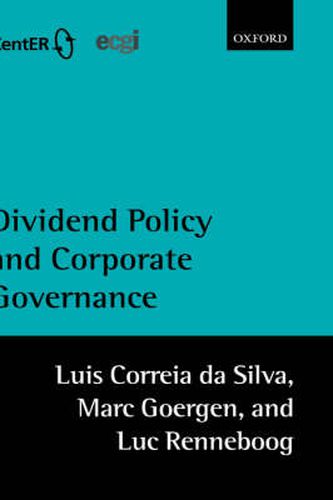Readings Newsletter
Become a Readings Member to make your shopping experience even easier.
Sign in or sign up for free!
You’re not far away from qualifying for FREE standard shipping within Australia
You’ve qualified for FREE standard shipping within Australia
The cart is loading…






Dividends are not only a signal about a firm’s prospects under asymmetric information, but they can also act as a corporate governance device to align the management’s interests with those of the shareholders. Dividend Policy and Corporate Governance is the first comprehensive volume on the relationship between dividend policy and corporate governance, and examines in detail empirical studies and current theories. Reviewing the interactions between dividend policy and other corporate governance mechanisms, it compares results for the UK and the US with those for other countries such as France, Germany, and Japan, and provides new empirical evidence on corporate governance in continental Europe and its impact on dividends. Focusing on one of the main representatives of this system, Germany, it highlights major differences between the dividend policies of German firms and those of UK or US firms. Conventional wisdom states that German dividends are lower than UK or US dividends, yet on a published-profits basis the exact converse is true. In addition, the authors demonstrate a link between corporate control structures and dividend payouts, report evidence that the existence of a loss
$9.00 standard shipping within Australia
FREE standard shipping within Australia for orders over $100.00
Express & International shipping calculated at checkout
Dividends are not only a signal about a firm’s prospects under asymmetric information, but they can also act as a corporate governance device to align the management’s interests with those of the shareholders. Dividend Policy and Corporate Governance is the first comprehensive volume on the relationship between dividend policy and corporate governance, and examines in detail empirical studies and current theories. Reviewing the interactions between dividend policy and other corporate governance mechanisms, it compares results for the UK and the US with those for other countries such as France, Germany, and Japan, and provides new empirical evidence on corporate governance in continental Europe and its impact on dividends. Focusing on one of the main representatives of this system, Germany, it highlights major differences between the dividend policies of German firms and those of UK or US firms. Conventional wisdom states that German dividends are lower than UK or US dividends, yet on a published-profits basis the exact converse is true. In addition, the authors demonstrate a link between corporate control structures and dividend payouts, report evidence that the existence of a loss